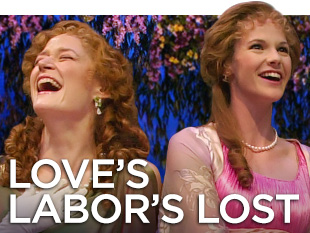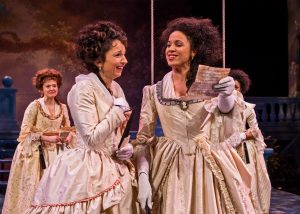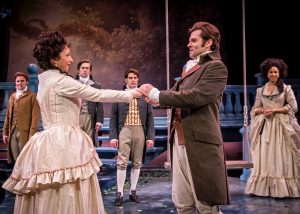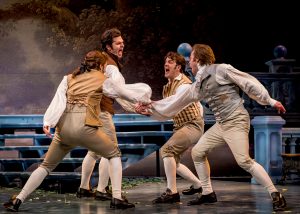NO ADO ABOUT LITTLE
Never has a lesser comedy enjoyed a lovelier setting: Embraced by a Rococo balustrade, staircase, and pastoral backdrop worthy of Watteau or Boucher, Chicago Shakespeare Theater’s Courtyard Stage is dwarfed by a huge oak tree in autumnal glory, discretely dropping selected leaves. It’s an apt backdrop for a Mozart opera; indeed the second act of Shakespeare’s brittle early comedy Love’s Labor’s Lost recalls Così fan tutte, while the first act predicts Tennyson’s The Princess (and Gilbert & Sullivan’s spoof Princess Ida) where it’s the women, not the men, who flee the opposite sex to pursue their studies without temptation. It all guarantees enchantment—which is more than can be equaled by Shakespeare’s courtly and artificial tale of impetuous love rightly frustrated.
The risk of doing Love’s Labor’s Lost, even by the Bard’s best at Chicago Shakespeare Theater, is seldom worth the reward, even when disguised as a quintessentially Parisian divertissement. Nonetheless, Navy Pier’s very game ensemble, inspired by former Stratford Festival director Marti Maraden, labor hard to delight when they can’t distract. It’s just hard to warm up to this cold 150-minute comedy, a word-crazed concoction that’s far more intent on impressing than entertaining.
Maraden’s 19 players are saddled with a precious plot in which the young King of Navarre and three noble friends foolishly agree to flee the company of women for three years in order to simply study. (No, they’re not gay.) This insult to nature, of course, must be punished—but Shakespeare wryly suggests that the men might have been right in the first place: When they fall for the Princess of France and her three confidantes, they’re more in love with love than with the ladies.
As the title implies, the comedy ends without a marriage, just a promise that a year’s absence may renew their romance. But somehow we know that these fickle vow-breakers and hypocritical wooers will only use their twelve months and a day to launch as many sexual shenanigans. (Shakespeare also throws in two utterly contrived and silly subplots: a masquerade with idiotic Muscovite courtiers who mistakenly court the wrong ladies and a poor man’s “Pyramus and Thisbe” crudity called the “Nine Worthies.”)
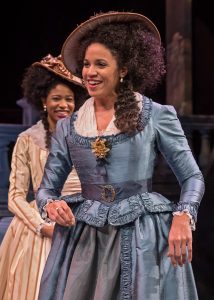 When Chicago Shakes last produced L.L.L. in 2002, Barbara Gaines set this divertissement in 1913, which implied that a year later the boys will find themselves at war: The women may have made a terrible mistake. That bittersweet menace is unavailable to Maraden’s unfailingly trivial action and occasionally ept comic business. Caught in the moment, these mayflies seem every bit as vulnerable as their capricious love. As Berowne, the cavalier who most mocks love and thus must suffer most, Nate Burger splendidly rings his character’s changes. He’s matched but not mastered by Laura Rook’s unnecessarily acerbic Rosaline. If the six other lovers—John Tufts, Madison Niederhauser, Julian Hester, Jennifer Latimore, Laura Rook, Jennie Greenberry, and, on opening night, understudy Leryn Turlington—seem as interchangeable as the quartet in A Midsummer Night’s Dream, they bring a saving energy to a comedy that’s much less playful. They keep the energy going, essential here so you don’t get mired in the Bard’s endless, at times, tedious raillery with its quips, quiddles, conundrums, persiflage, lost puns, badinage, neologisms, and foreign flourishes. It would be easy to suggest cutting this play but where would you stop?
When Chicago Shakes last produced L.L.L. in 2002, Barbara Gaines set this divertissement in 1913, which implied that a year later the boys will find themselves at war: The women may have made a terrible mistake. That bittersweet menace is unavailable to Maraden’s unfailingly trivial action and occasionally ept comic business. Caught in the moment, these mayflies seem every bit as vulnerable as their capricious love. As Berowne, the cavalier who most mocks love and thus must suffer most, Nate Burger splendidly rings his character’s changes. He’s matched but not mastered by Laura Rook’s unnecessarily acerbic Rosaline. If the six other lovers—John Tufts, Madison Niederhauser, Julian Hester, Jennifer Latimore, Laura Rook, Jennie Greenberry, and, on opening night, understudy Leryn Turlington—seem as interchangeable as the quartet in A Midsummer Night’s Dream, they bring a saving energy to a comedy that’s much less playful. They keep the energy going, essential here so you don’t get mired in the Bard’s endless, at times, tedious raillery with its quips, quiddles, conundrums, persiflage, lost puns, badinage, neologisms, and foreign flourishes. It would be easy to suggest cutting this play but where would you stop?
The clown characters in Love’s Labor’s Lost are often impenetrably obscure, perhaps the best excuse for the physical humor behind Alex Goodrich’s silly-ass Costard (a crowd-pleasing charmer indeed), Steven Pringle’s deliberately lackluster Constable Dull, David Lively’s hilariously bloviating schoolmaster Holofernes (a cross between Professor Marvel and Mark Twain’s scoundrelly Duke), Greg Vinkler’s dithering and stagestruck vicar, and Allen Gilmore’s extravagantly officious Don Adriano de Amado, a Spanish fop who seems to be Shakespeare’s personal revenge for the Armada. Maggie Portman has some richly sluttish moments as the always available Jaquenetta, and James Newcomb brings epicene suavity to the elderly courtier/counselor Boyet. The one song, “The Owl and the Cuckoo,” a kind of bittersweet ode to winter that concludes the comedy, is an unforced charmer.
Alas, this—and not that play about Sicilian lovers celebrating a summer of combustible confusion—is Shakespeare’s real “much ado about nothing.”
production photos by Liz Lauren
poster photo by Bill Burlingham
Love’s Labor’s Lost
Chicago Shakespeare Theater
Courtyard Theater on Navy Pier
ends on March 26, 2017
for tickets, call 312.595.5600 or visit Chicago Shakes
for more shows, visit Theatre in Chicago
